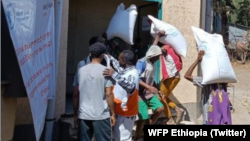More aid arrived in Ethiopia's Tigray region following the signing of a truce earlier this month calling for unhindered humanitarian access to the war-torn northern region.
Catholic missionary, Father Alfred, told The Associated Press that hospitals were yet to be receiving adequate medicine supplies.
"If this is continued I think that it is very good. But this seems to be the first step. Medicines also, the hospitals say that there's not yet enough," said Alfred.
"Starvation-related deaths" have been reported at camps for the displaced by U.N. teams that visited the area in September.
Tigray is in the grip of a dire humanitarian crisis, the result of two years of restrictions on aid.
"If this is continued I think that it is very good. But this seems to be the first step. Medicines also, the hospitals say that there's not yet enough," said Catholic missionary Alfred.
These restrictions prompted a U.N. panel of experts to conclude that Ethiopia's government probably used "starvation as a method of warfare" against the region.
Fighting that erupted in August after months of a lull displaced 500,000 people in northwestern Tigray alone, according to a document by Tigray's regional Emergency Coordination Center that was seen by AP.
The ceasefire deal, struck in South Africa with the backing of the African Union, also calls for the restoration of services to Tigray, although the region still does not have access to internet, phone and banking services.







